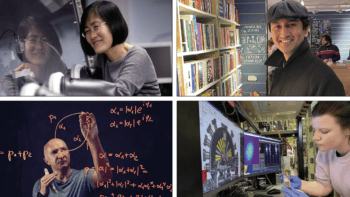Priyamvada Natarajan is a theoretical astrophysicist, professor and director of the Franke Program in Science and the Humanities at Yale University, US. She is the author of Mapping the Heavens. Natarajan is one of 10 physicists profiled in the March issue of Physics World to launch our new Ask Me Anything careers advice column

What skills do you use every day in your job?
My research revolves around building testable physical models of cosmic phenomena that are guided by current observational data, and can be tested with robust verifiable predictions. A strong foundation in physics and mathematics, combined with a systems approach to problem solving, are the crucial skills that I honed as an undergraduate at the Massachusetts Institute of Technology, and use every day on the job. The systems-thinking approach to a problem helps me pare down complex ideas and sift out critical ingredients – I first solve a simple version that captures the key features, before gradually adding back the complexity.
Thanks to my interdisciplinary career trajectory (I also have a graduate degree in the history and philosophy of science), I care deeply about expressing my ideas and processes and I aspire to write clearly and communicate effectively. I am a people person, and have cultivated emotional intelligence that stands me in good stead when working collaboratively in science. Adventurous and curious by nature, I have always enjoyed learning with an open mind and have been receptive to radical new ideas – and this has over time given me the courage and confidence to take intellectual risks.
What do you like best and least about your job?
What I love best about my job is the continuing thrill and joy of figuring things out when problem-solving. There is a sense of unadulterated joy that I derive from understanding something that seemed out of reach just an hour, a day, a week or a month ago. I enjoy the collaborative nature of research, interacting with other scientists from around the world, and working with others who may think very differently and bring new perspectives and insights. I also love the contact with the students I teach and mentor, who continually expose me to fresh ways of engaging with the world.
There are aspects of academic culture that I am not a great fan of, such as the emphasis on relentless self-promotion, the chasing after rapidly declining resources to fund basic science research like my own, and the competitiveness that occasionally descends to the petty. I know that science is a human endeavour and appreciate it deeply for that very reason, but the clash of ideas, which gets unnecessarily fierce sometimes, bothers me greatly. Another aspect that I find irksome is the growing level of bureaucracy and, in particular, inefficient meetings.
What do you know today that you wish you knew when you were starting out in your career?
There are a couple of things that I wish I had understood better when I was starting out in my career. The first is that each one of us gets to define success in our own terms, and create our very own personal collage of what matters to us – in our career, family, community, passions and interests – that collectively drives and catalyses us. Second, when I was young, I often felt like an outsider and this caused a sense of unease. Now, I have come to realize that being caught in this tussle between feeling like an insider and outsider is actually an empowering place to be, as it is freeing.
Finally, I wish I had known and understood that perseverance and persistence really come in handy for those intending to (and often compelled to) take intellectual risks – there will be resistance and one needs to accept that and be prepared to tackle it. Most of all, though, I am super grateful for having had the advantages, privilege and opportunities that have enabled me to pursue my personal dreams in my career and life.



